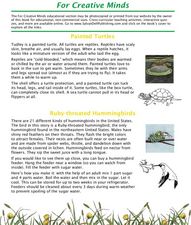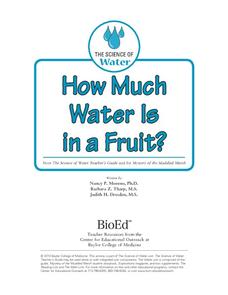Curated OER
Saving the Wetlands
In this wetlands worksheet, students read 4 paragraphs about wetlands then complete 2 short answer questions regarding the reading.
Curated OER
For Creative Minds: Tudley Didn't Know
Students discover facts about the animals in John Himmselman's book, Tudley Didn't Know, and make a paper turtle. In this marsh animals instructional activity, students first read the book Tudley Didn't Know. Students read facts about...
Curated OER
Loss of Wetlands: Subsidence
Pupils observe subsidence and the effect it has on wetlands with a classroom demonstration. They think about the impact of global warming and the sea level and how it affects the marsh.
Curated OER
Phragmites australis: Invasive Plant Species
Students research and investigate invasive species, with specific focus on the exotic plant Phargmites australis and its impact on Piermont Marsh near the community of Piermont, New York.
Curated OER
UMNH: Cultural Clutter - Tales In The Trash
Fourth graders list three or more types of evidence of prehistoric cultures that encouraged archaeologists to investigate the marshes around the Great Salt Lake. They also explain why it is important not to disturb archaeological remains.
Curated OER
If You Mess With A Wetland, At Least Try to Make Amends!
Eighth graders examine the role of wetlands in an ecosystem. In groups, they use the internet to research how humans have disturbed and ruined the effectiveness of wetlands throughout the country. They pretend they are in charge of...
Curated OER
Important Arkansas People
Famous people in the history of Arkansas are the focus of a history lesson plan for kindergartners. Pupils identify important Arkansas citizens, such as President Bill Clinton. They create an illustrated poem that features some of the...
Baylor College
What Is the Water Cycle?
Small groups place sand and ice in a covered box, place the box in the sunlight, then observe as evaporation, condensation, and precipitation occur. These models serve as miniature water cycles and demonstrations of the three phases of...
Baylor College
What Makes Water Special?
Get close up and personal with a drop of water to discover how the polarity of its molecules affect its behavior. Elementary hydrologists split and combine water droplets, and also compare them to drops of oil. Much neater than placing a...
Baylor College
What Dissolves in Water?
One of water's claims to fame is as the universal solvent. Young physical scientists experiment to discover which materials dissolve in this special compound. You could never be more prepared for teaching this lesson than by using this...
Baylor College
Can Nutrients in Water Cause Harm?
Ecology candidates culture pond water organisms over a few days time, then they experiment to find out how increasing nutrients affects the population. As part of a unit on water, this exploration gives your class an understanding of how...
Baylor College
What Is a One Part Per Million Solution?
Water may appear to be crystal clear, but there could be dissolved substances present. Lab groups make a one-part-per-million of a food coloring solution to demonstrate this concept. As part of an outstanding unit about water, this...
Baylor College
How Can We Find Out What Is in Water?
Using paper chromatography, water watchers discover that several substances might be dissolved even though they aren't visible. In this case, you will prepare a mixture of three different food colorings for them to experiment with. A...
Curated OER
Poverty Point: A Louisiana Treasure
A well-done and informative presentation, this resource could be used to pique interest in Lousiana's history. This presentation about Poverty Point, a mound created by Native Americans, is a fascinating exploration of this topic. What...
Curated OER
The Chesapeake Bay in Captain John Smith's Time
When Captain John Smith visited the Chesapeake Bay in the summer of 1608, what types of animals and habitats did he encounter? Your young historians will analyze primary source documents to answer this question, as well as compare the...
Curated OER
Wetland Metaphors
Learners describe the characteristics of wetlands and identify their ecological functions. They inspect items and use them to create metaphors about wetlands.
Curated OER
Big Arky, A Real Arkansas Monster
Middle schoolers examine the world of the Arkansas alligator and topics that are related to wetland environments. They pay attention to the relationship between geography, climate, environment, and the animals who live there. A role-play...
Curated OER
What's In A Name? British Surnames Derived from Places
Students study how British surnames were derived from locations. They observe that some of the more common names are still prevalent today.
Baylor College
Why Is Water Important? Pre-assessment
This water worksheet is just the tip of the iceberg! It a multiple-choice quiz meant to be a pre-assessment for a wonderful water unit. There are 10 questions to be answered regarding the role, properties, and behavior of water. Make...
Baylor College
How Much Water Is in a Fruit?
Compare the volume of an orange to the volume of liquid that can be extracted out of it. Also compare the mass of an apple before and after it has been dried out. In both of these activities, children find that there is an appreciable...
Baylor College
How Much Water Do Humans Need?
Physical or life science learners measure the amounts of water eliminated by intestines and the urinary system, and the amounts lost via respiration and perspiration. In doing so, they discover that the body's water must be replenished...
Baylor College
How Do We Use Water?
Send youngsters home to survey how they use water in their homes. Then bring them together to discuss which uses are essential for our health and which are not. A helpful video offers teaching tips for this lesson, and a presentation...
K5 Learning
Addition and Subtraction Word Problems #2
Third graders read nine word problems and decide whether to add or subtract. The problems involve mostly 2-digit addition and subtraction.
Curated OER
Examining the Stages in Ecological Succession
In this ecosystems worksheet, students use illustrations and descriptions of four ponds to determine the order of succession. Students complete 8 fill in the blank questions and 5 short answer questions.
Other popular searches
- Marshall Plan
- Thurgood Marshall
- Salt Marshes
- Marshmellow
- Marshmallow Catapult
- James Marshall
- Thur Good Marshall
- The Marshall Plan
- John Marshall
- Marshall Plan Cartoon
- We Are Marshall
- Marshall Plan Africa

























